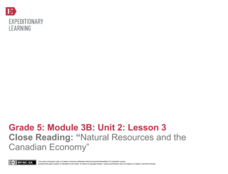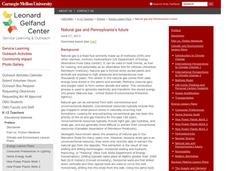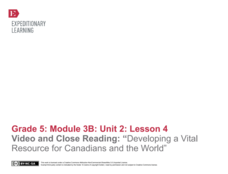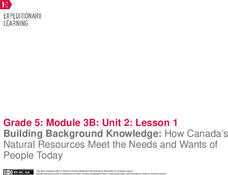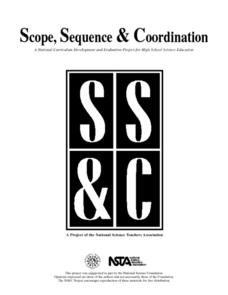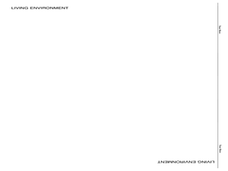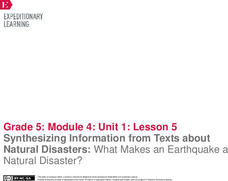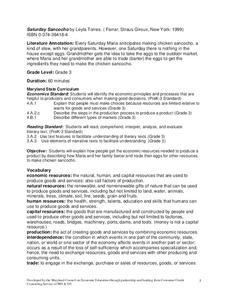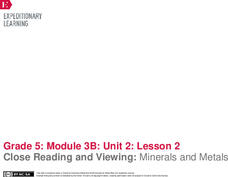EngageNY
Close Reading: “Natural Resources and the Canadian Economy”
Readers continue to learn how natural resources are important to Canada's economy. They read, annotate, and answer text-dependent questions about Natural Resources and the Canadian Economy. They then discuss key terms in the text.
Little Kids Rock
The Influence of Latin Music in Postwar New York City
Music has often been called the international language that transcends cultures and regions. Scholars analyze the impact of Latin American music on New York City culture in the years following World War II. They research music, video,...
Carnegie Mellon University
Natural Gas and Pennsylvania’s Future
Beginning with a general discussion about natural gas, methane, and hydrocarbons, a few videos and diagrams are projected to support the lecture. Individuals participate in a brief activity by drinking juice through a straw, and then...
Global Oneness Project
Learning with Nature
Think outside the box - and think about education beyond the classroom walls - with a resource that has your critical thinkers watching a video about a nursery in Scotland that lets youngsters roam wild in a forest. Viewers reflect on...
Curated OER
Selecting the Tap: Water Safety
Examine water as a scarce natural resource instead of taking it for granted. Middle schoolers identify the traits of potable water, and research local water sources to determine if they are impaired or not.
EngageNY
Video and Close Reading: “Developing a Vital Resource for Canadians and the World”
Scholars watch Developing a Vital Resource for Canadians and the World to learn about the supplement potash that helps plants grow. They watch the video several times, completing a note catcher to record key ideas along the way. Pupils...
EngageNY
Building Background Knowledge: How Canada’s Natural Resources Meet the Needs and Wants of People Today
Learners follow along as the teacher reads Products of Mining in Canada: From Batteries to Vehicles aloud. They then discuss the meaning of key terms and determine the gist of the text. Pupils do a second read and complete a graphic...
Curated OER
Glacial Groundwater
Young scholars study glacial deposition and groundwater in Dutchess County, new York. They identify the permeability rates in different glacial deposits and relate this information to ground water capacity of sediments found in Dutchess...
Curated OER
Past and Present New York Through A Comparative Study of Photography and Poetry
Students study New York in three time periods, 1890-1930, 1930's, and 1950's-60's. They discuss themes that are important in each time block. They describe a brief historical picture of each time period before they approach works of...
Curated OER
Mapping Where Animals Live
What type of reptiles live in New York State? This instructional activity gets the class thinking about what factors determine where particular animals live. They analyze the Hudson Valley environment, identify specific reptile and...
Curated OER
Limiting Factors for Populations
The "Bottled Bacteria" activity instructions are a bit unclear, but the remaining activities investigating limiting factors in ecosystems are well-written. Learners model the exosystem of a bear and a herd of deer. They set up a...
EngageNY
End of Unit Assessment, Part 1: Research and Response
Stay on target. The class reviews the learning targets for the unit and the end of unit assessment. Scholars then begin working on part one of the assessment answering how Canada's natural resources meet the needs of the people and how...
Curated OER
Regents High School Exam: Living Environment 2008
Tne New York Regents High School Examinations are comprehensive and include various styles of questions, includingmultiple choice and the analysis of graphs. This particular version, the 2008 Living Environment exam surveys a variety of...
Curated OER
How Does Your Garden Grow? Discovering How Weather Patterns Affect Natural Cycles
For the warm-up in this cool climate lesson, you will need to click on "Mapping" and then "US Mapping" once you arrive at NOAA's "US Climate at a Glance" page. Earth science explorers realize that 2012 was a warm winter for us. They read...
EngageNY
Synthesizing Information from Texts about Natural Disasters: What Makes an Earthquake a Natural Disaster?
Are all disasters natural? Scholars reread Earthquakes! to determine what classifies these events as a natural disaster. They label earthquake facts as N for natural or D disaster to support their ideas. They then discuss academic...
EngageNY
Organizing Evidence from Multiple Informational Texts to Prepare for Writing: What Makes an Earthquake a Natural Disaster?
Fifth graders prepare for their end of the unit essay assessment by continuing to look at what makes an earthquake a natural disaster. They complete a graphic organizer and write a topic sentence. To finish, they view a model essay and...
Curated OER
Does Mother Nature Know Best?
Investigate herbal medicine in the science or health classroom with this lesson from the New York Times. After a discussion about class members beliefs about and experiences with herbal medicines, pupils read an article that might impact...
Curated OER
Understanding the 1855 Census Database
Use data from the 1855 New York census to better understand the Irish immigrant experience during the late 19th century. Young historians analyze information from the census and build three hypotheses regarding the residents of the Five...
EngageNY
Mid-Unit Assessment: Text-Dependent and Short Answer Questions: Excerpts from “A Limited Supply”
There's no such thing as an unlimited resource. Scholars complete a mid-unit assessment by reading A Limited
Supply. They answer text-dependent questions and complete a graphic organizer about key terms in the text.
Curated OER
Use Or Abuse?
Students explain the meaning of "use value" of nature's resources by researching and writing studenT books personifying an aspect of nature. They produce public service announcements regarding use value for their local community.
Curated OER
Saturday Sancocho
Second graders identify the economic principles and processes that are helpful to producers and consumers when making good decisions. Students will read, comprehend, interpret, analyze, and evaluate literary text as well as explain how...
EngageNY
Close Reading and Viewing: Minerals and Metals
How easy is it to live off the land? Scholars read Minerals and Metals in Your Life and discuss how Canada's natural resources meet the needs of the people. Pupils watch a brief video and discuss the gist of the text and video. They then...
EngageNY
End of Unit Assessment, Part 2: Research and Response
Talk it out. Scholars complete part two of the assessment by participating in a World Café discussion activity. Learners circulate the room, sharing their ideas and thoughts about Canada's natural resources using quotes and paraphrasing...
Curated OER
Building New York
Eighth graders study the five points neighborhood in New York City. In this NYC lesson, 8th graders research websites to help them understand the five points neighborhood.


